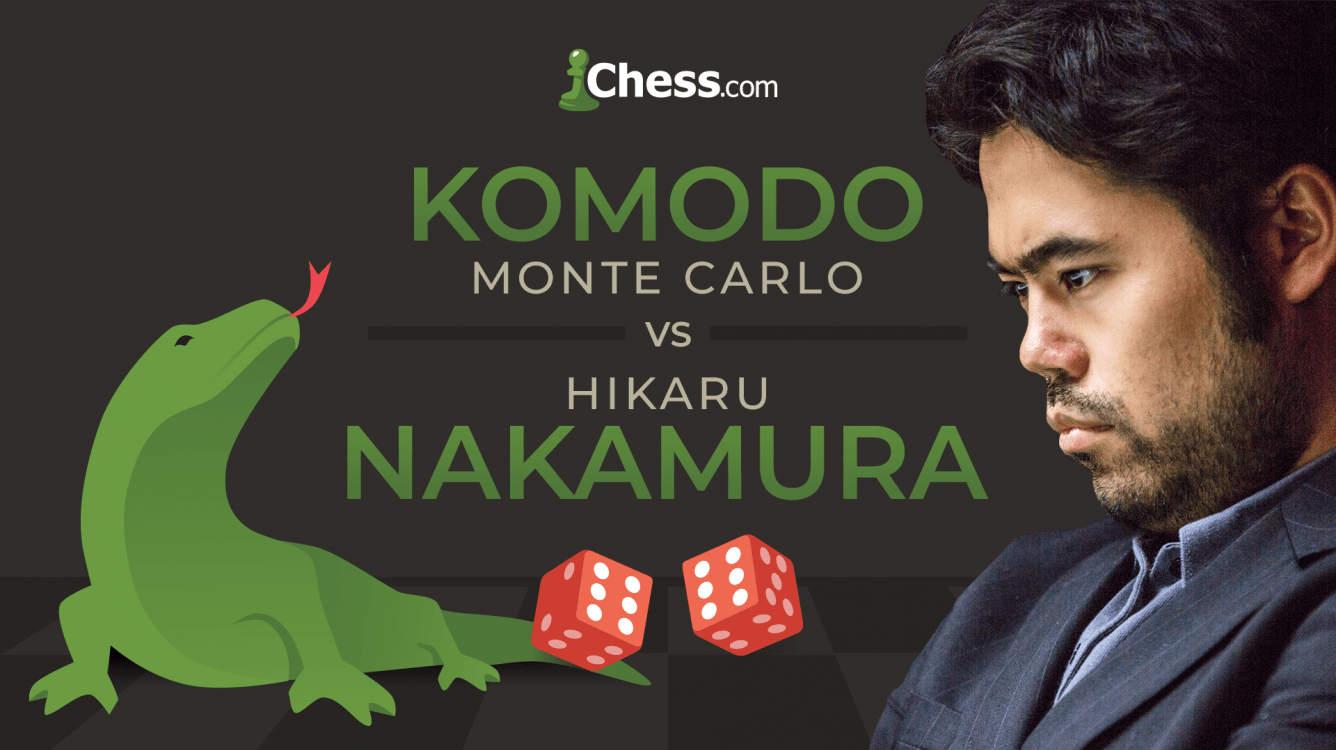
Nakamura 'Adopts' Komodo On Fathers Day: 20.5-2.5
On Sunday, Hikaru Nakamura played all 20 levels of Komodo available on Chess.com followed by three odds-chess games, and scored 20.5-2.5 in total.
It was the first man-machine match since Chess.com acquired Komodo, and made full use of its latest features. Nakamura started by playing a game against each of the 20 skill levels currently available in Live Chess, which have some of the most human-like play ever seen from engines at the lower ratings.

This is where you can try out the 20 levels yourself.
The Komodo levels games were played with no odds at a blitz time control of five minutes plus five seconds increment. Nakamura played the white pieces in all 20 games.
The American GM was expected to make short work of the weaker Komodo levels, but the big question was at which point (i.e. at which level) Komodo would start making his life hard.
Nakamura played 1.d4 in the first five games, but then switched to 1.b3, with a hippopotamus setup, for the remaining 15.
Game 12 was nice. First, White castled "by hand," and then Komodo let its queen be trapped in the middle of the board:
Game 14 saw Komodo trying his luck on the queenside, and Nakamura slowly building up a kingside attack that the engine must have underestimated with its limited horizon. It was games like these that we saw in the old (say, 1980s) human-computer matchups, when disdain towards the silicon entities was still justified!
Level 18 put up stiff resistance, first by creating some kind of fortress on the dark squares that Nakamura managed to break with a pawn sacrifice. Later, a queen endgame was hard to win (the computer must have played near perfectly there) but the human conquered machine there as well, checkmating on move 142.
After 19 straight losses by its lesser brothers, only Komodo 20 proved up to the task. 13...h5 (simply intending 14...h4, while 14.h4 isn't ideal) was the first mark for Nakamura that this wasn't going to be easy, and the machine's play in the whole game was logical and clear.

After that, an even more interesting part of the match began. Nakamura was slated to face the newest version of the engine, Komodo Monte Carlo, in three different positions designed to level the chessboard for the human.
In these three games, all with 10 minutes plus five seconds increment, Komodo Monte Carlo was running on a powerful, 16-core computer (i9-7960x, overclocked to 4.1 GHz, 64 GB RAM, 5-piece Syzygy endgame tablebases).
The key difference is that Komodo Monte Carlo chooses its moves by win probability instead of traditional evaluation. The approach is similar to the probabilistic methods of the machine-learning chess projects AlphaZero and LeelaChess.
Game 1: Pawn and two moves
In this game, Komodo was Black, missing its f7 pawn, and the white pawn starts on e4. White to move. Or in other words, Black's position is seriously weakened and White starts with a nice pawn center!
Interestingly, Komodo sacrificed a pawn right away to get some tempi. After that, the position got somewhat closed but another sacrifice on move 34 made things very complicated, and with great defense the computer proved to have enough compensation for a slight material deficit in the endgame.
Game 2: Knight for pawn
Komodo was White and Black started with a knight instead of a pawn on f7.
It's not easy playing Komodo, and still not easy with an extra knight. Nakamura moved all three horses close to his king, which resulted in a safe, but slightly passive position.
Komodo MC accepted the repetition with Nakamura in time trouble. Komodo developers said that if the engine's contempt factor were higher, it would have played on.
Game 3: The Knightmare
The most unnatural, but also most fun game. Komodo was White and all of its pieces were replaced with knights, while Black's knights were removed. A true (k)nightmare, where only a computer can maneuver its horse as skillfully as in this game.
Commentators including GM Georg Meier, who will participate in the Speed Chess Championship qualifier next week, had boasted about the position being easy to win for the human, but Komodo had other ideas.
Nakamura was surprised but also cheerful when he had to give a perpetual check, and speaking to commentator IM Danny Rensch, he noted: "You'll never see that mating net again!"

In the total match, Nakamura scored 20.5/23, and 1.5 out of 3 in the Komodo Monte Carlo odds games.
"Overall, I’m happy with the play and results for the [Monte Carlo] version, and also that Komodo managed a win on the top level [20],“ said GM Larry Kaufman of the Komodo team.
"In all the odds matches I got great positions, much better than I was expecting," said Nakamura, "The moral of the story is: You can't make any kind of mistake. And that's the hardest part."
Chess.com will most probably see more man-machine matches in the future, if only because Nakamura stated he likes the challenge of beating the computer.
The match was played on Sunday, June 17 with Nakamura streaming his own commentary at Chess.com/TV and Twitch.tv/chess. You can replay the stream here.

